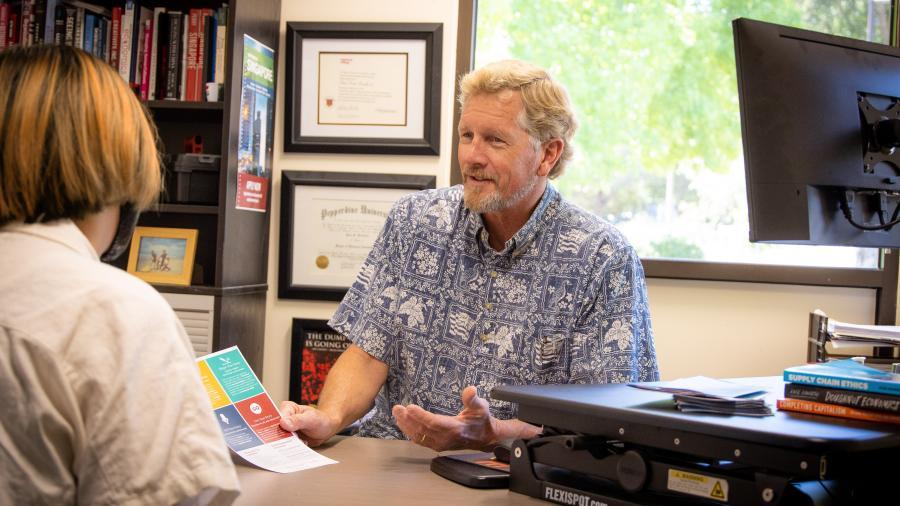Westmont Magazine COVE Helps Students Launch Their Lives After Westmont

Westmont is close to the beach, but we have a COVE right on campus that students can visit anytime. Instead of sea creatures and sand, they’ll find career advice and resume help. The former Office of Career Development and Calling has adopted a new name: Office of Career Opportunities and Vocational Exploration, or COVE Career Center.
Paul Bradford ’84, director of COVE, explains his rationale for the name change. “A market research project on campus concluded that 82 percent of students found understanding God’s calling in their life to be daunting,” he says. “A similar percentage of students associated the term with a singular thing God wants them to do. I concluded that the word ‘calling’ was pre-loaded with meaning in our students’ minds and that our culture, rightly or wrongly, has ‘vocationalized’ the term ‘calling’ to equate with profession. That set in motion a three-year effort to change the name.
“Given Westmont’s proximity to the ocean, the term COVE came to mind. We were deliberate with the plural ‘opportunities’ to remind students they can apply the things God made them good at within multiple careers. The term ‘exploration’ better fit an evolving job landscape where today’s graduates will work in more than a half dozen jobs in their lifetime. As a subtle homage to the broader concept of calling, the Latin root of the term ‘vocational’ is ‘vocare,’ which translates as calling.”
Although the name of the office has changed, the mission statement remains the same: to help students understand and pursue the things God made them good at—and help them articulate their story and Westmont experience with an authentic confidence to pursue and find meaningful work.
COVE’s website (westmont.edu/cove) expands on this mission statement by explaining the four-pronged approach to advising students: Know Your Story, Shape Your Story, Tell Your Story, Live Your Story. “We start by helping students understand and articulate how they’re wired through various personality assessments that can help them interact better with friends, classmates and coworkers,” Bradford says. “We help students build a framework for thinking about what’s next and can guide them to evaluate choosing a major, nailing their resume and LinkedIn profile, pursuing two or more internships and landing a meaningful job—or applying to graduate school after college.”
Through COVE, students can get advice and practical tips for whatever future path they choose. The office offers an extensive collection of resources on its website.
“COVE Career Center stands out because of our team,” Bradford says. “They understand our mission, care about our students, develop partnerships and find ways to offer a helping hand to students.”
The dedicated team includes professionals who love to help students discover themselves and find meaningful work. Julissa Delgado manages student employment on campus. She makes everyone who comes to the center feel welcome. Janay Ramos Marshall ’01 oversees employer relations, and she applies tenacity and kindness to connect employers to students. Cassie Wicoff Wiltsey serves as the career counselor and teaches a class, Shaping Your Westmont. She is passionate about helping students understand themselves. Bradford leads the team. The Westmont alumnus returned to campus after a 30-year marketing career. He has also taught economics and businesses classes as an adjunct professor since 2008 and co-leads the Singapore Summer Session with President Gayle D. Beebe.
Despite its many resources for students, COVE competes for their attention. As the college doesn’t require students to meet with anyone in the center, COVE staff members get creative in reaching out to the student body. For example, they’ve developed relationships with professors to integrate career content into classes.
“Faculty are blessed to spend hours per day with students,” Bradford says. “We’re lucky to get a single hour with students before they graduate, making it important to connect with professors so they can help students prepare for life after college.”
COVE also employs students as career design ambassadors in every residence hall. They hold weekly office hours so students can talk to knowledgeable peers about job searching, resumes and more.
COVE staff faced a big challenge when the class of 2020 graduated in the early months of the coronavirus pandemic. Bradford originally expected employment rates for these new alums to drop 20-25 percent below average. Instead, due in part to the determined and extensive efforts of his team, 92 percent of the class of 2020 found employment, began attending graduate school, or were planning to attend graduate school six months after graduation. That total dropped only slightly below recent averages of 96 percent.
“We researched projected growth industries, provided tips for interviewing online and highlighted other career-related best practices, culminating in our expanded Know Before You Go website and our Senior Guidebook: Graduating in the Age of COVID-19,” Bradford says.
“Although our team’s effort certainly helped many graduates launch well, I know the real credit belongs to the students’ hard work and the underlying foundation forged by their Westmont experience. Rigorous academics, a deep Christ-centered framework and the relational commitment of a selfless and dedicated faculty and staff have done, yet again, what it was intended to do: help young men and women prepare for life after college. The outlook is certainly brighter this year.”
Becoming an adult can be intimidating at the best of times, but facing graduation and an uncertain job market exacerbates students’ fears of the future. What encouragement does Bradford give? “Just get started,” he says. “Don’t let the ambiguity or the perceived enormity of getting from point A to point B keep you from taking a first step. We can help with simple and practical resources.”


